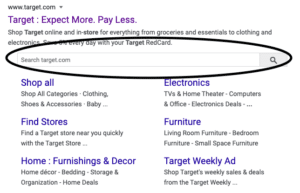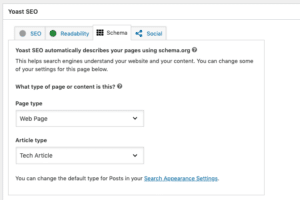I’m all about the free tools that make life easier for business owners just like you and me. And I’ve always been a fan of the Yoast SEO plug-in for WordPress. They have a free version that we use on EVERY client’s website. In some situations, I encourage clients to purchase the premium/paid version. For $90 it offers some pretty nifty features like the following:
- allowing your information to show in search in other languages,
- offering a focus keyword suggestion based on the content you’re using most often in your page or post,
- and suggesting internal links to other pages or articles based on the content on your pages and posts.
But let’s be real. You can nickel and dime yourself to death with all the add-ons, upgrades, and extra software that helps your business run more smoothly. And while $90/year probably isn’t a big deal, I could make 1,000 suggestions that would cost you that much and more.
Tools can really add up in the business expense column. And we are fierce protectors of your profitability. So, we like to make sure you’re spending money on what you need most.
(Do you really need SEO right now? Take the Fix This Next Assessment to make sure you’re working on the most important thing your business needs before you spend another dime.)
On top of Yoast Premium, they also offer other add-ons to help with your video SEO, local SEO, news SEO, and WooCommerce SEO. Each of those plug-ins cost $69/year. Totally worth it if you have those categories of content on your site. And you are looking to focus on SEO.
Yoast Making Life Easier for FREE
But here’s why I’m super pumped right now. In a recent update, Yoast SEO added schema markup to their WordPress FREE tool!!! Woot!
You might be thinking, ok…
What is schema markup and why is it important?
Schema markup is nerd speak for adding code to your site. This code tells search engines what kind of information is on your page. I can say nerd because I proudly am one. ?
If you want all the technical info, check out schema.org for a deeper dive. For our purposes here, let’s just say that in the past, you’ve needed someone who writes in html to get into your page or post and add some code to tell search engines that this page is a product or an FAQ or a search result or news item.
And why would you want to do that? Because that’s how your search results start to show up for the consumer as categories below your search description. This allows browsers to choose their own adventure. To know what kinds of things you have on your website. Even if they started their search looking for something else.
So, when I search “target stores” in google, I can search the Target website right from the google search results.

That’s because Target has schema markup on their website that tells the search engines they have search capabilities on their website.
Same with the “Find Stores” and “Shop all” categories. They have schema markup on each product page to let search engines know, this is a product. That allows the search engines to serve up categories like “Furniture” under the main search, once you have enough content on your site in that kind of category.
Schema markup is ALSO how you show up in one of Google’s main search categories. Like news or shopping or videos, etc.
![]()
Before this addition, the FREE Yoast tool was providing the content topic to search engines when you put your focus keyword in the plug-in. But it did not tell search engines what kind of item your page or post was.
Schema.org provides a very specific but standard way you must note different categories on your site in order for search engines to display category type information in search results as pictured above.
Schema.org gives the following example of appropriate markup for letting search engines know you are displaying a person related to a movie…yes…that’s how detailed it can get. Lots of rabbit holes you can explore if you have the time.
<div itemscope itemtype ="http://schema.org/Movie"> <h1 itemprop="name">Avatar</h1> <div itemprop="director" itemscope itemtype="http://schema.org/Person"> Director: <span itemprop="name">James Cameron</span> (born <span itemprop="birthDate">August 16, 1954</span>) </div> <span itemprop="genre">Science fiction</span> <a href="../movies/avatar-theatrical-trailer.html" itemprop="trailer">Trailer</a> </div>
What did Yoast do?
Yoast just added a schema tab to the FREE version of their plugin.

Instead of having to know html and add the right markup in the right way to each page of your website, Yoast just gave you a dropdown menu…for FREE!
There’s not a ton of recent data, but a couple of years ago, Google said around one-third of their search results display in schema categories. Anecdotally, I rarely see search results displayed in this manner unless I’m looking at retail stores and shopping items.
Adding schema definitely helps you rank higher in search results. Search engines give preference to organized content with information that helps them understand what they are serving up to people who are searching.
That means using schema can put you ahead of the search curve.
The Bad News
There are limitations to this free version of schema markup Yoast provides. There are hundreds of categories schema.org has for item types. (Enter the rabbit holes referenced earlier.) The Yoast plugin allows you to choose from 10 – 20 categories for your page and article type. Some of the biggest items I see missing right now are “Event,” “Location,” and “Video.” BUT you can have location markups with the paid “Local SEO” plugin provided by Yoast. Same with video content. In cases like these, if you have a ton of video content or you regularly hold events, you can pay a little and gain a LOT with these paid Yoast tools.
Yoast’s FREE Schema Tool Helps You Get Ahead
Like I mentioned, there are limitations of the free schema version. But, I believe if you use the SEO Schema tool, you’ll outrank most websites. And that’s without having to pay an SEO expert. Most business owners are not SEO experts. So, unless they have hired an expert team, schema will give you an edge over your competition.
If your most important business goal is to organically attract more people to your product or service, and you have specific types of items that are not included in these Yoast tools AND you don’t have html skills, you might be ready to hire an SEO expert to help your milkshake bring all the boys to the yard.
Not sure if you should hire an expert or not? You can hire my brain for an hour, and I’ll walk you through a decision tree designed to make sure you get an ROI before you make an SEO investment. We’ll walk through priorities for your business, lower cost alternatives to having someone do SEO for you, and what you should expect to pay to have SEO done right.
In the meantime, you can use the Yoast free tool and get yourself better results than the majority of business owners out there.

